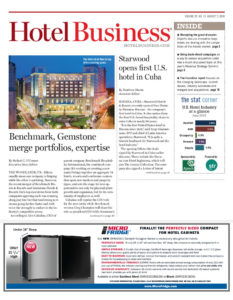NATIONAL REPORT—It’s no secret that Airbnb is a disrupter, but how are hotels handling the competition? A CEO, a GM, industry representatives and others share their views. Additionally, iModerate, a qualitative market research firm, recently performed a study that sheds some light on the industry’s great disrupter and found boutique hotels might be able to get a piece of the pie the sharing economy is baking.
“We started by looking at the difference between Airbnb and hotels and we wanted to know three big things,” explained Katie Houser, marketing manager for iModerate. Using open-ended questions, which garnered “meaty responses,” iModerate’s team of analysts attempted to identify the situations where a consumer would want to stay in either an Airbnb property or a hotel; who would stay there; and what the consumer expects from the experience. What they found was very interesting.
After the interviews were complete, the team used text analytics to gauge true customer perception by pulling out words and their meanings. Taking into account the verbiage used, Houser said consumers enjoy Airbnb because it gives them a different level of access to a city and a unique experience. A phrase people used about the appeal of Airbnb was “in the heart of a neighborhood,” according to Houser.
Cost is a factor as well, but not as big as one might expect, according to Houser, who said that public perception is that an Airbnb stay is less expensive than a hotel. iModerate also found that consumers use Airbnbs for the kitchens because it could save them more money. “There’s a sentiment that you can stay in a unique and local place without paying a premium price,” Houser explained.
iModerate found interaction comes into play when consumers are deciding whether to use Airbnb or book a hotel. “In terms of the host, they want someone there if they need them but otherwise to leave them completely alone,” Houser said of the consumers who prefer Airbnb. One widely held belief, which iModerate was not able to corroborate, was the idea consumers seek out Airbnb when they want to stay in a larger group or with multiple families.
Hotels hold an advantage, according to Houser, because consumers trust the experience and believe hotels offer a consistent business model. “People love the fact that a hotel is an organization, whereas they see Airbnb as an individual. There’s a big level of trust with a hotel,” Houser expressed.
Hotel guests want to feel taken care of, said Houser, who pointed out the sentiment among consumers is, “If I’m staying at a hotel and something goes wrong someone will take care of me.”
When it comes to hotels, the consumer simply expects more. According to Houser, consumers “obsess over” the pillows and linens in hotels and have come to anticipate these amenities in addition to a large breakfast, pool and gym. At an Airbnb property, consumers are more easily pleased: They only expect WiFi. “For hotels, the idea is that location and price are not paramount. You are paying for the experience and the amenities,” Houser noted.
Hoteliers also feel the experience of travel and amenities are important. “My vision of staying at a hotel is you go there to have someone take care of you. You don’t have to make your bed. I think that experience of traveling is lost when you don’t stay at a hotel,” said Colby Brock, GM of Radisson Hotel New Rochelle, New York.
Capitalizing on trends, including experiential travel, can be a selling point for hoteliers, according to Frances Kiradjian, founder, Boutique & Lifestyle Lodging Association (BLLA). “We know that travelers today are looking for local access and insider experiences. Hotels have a leg up in offering both and can capitalize on this by offering services such as personal shopping with a local guide, access to hard-to-book restaurants or perhaps seeing the city with a GM or another hotel insider. Wellness is hotter than ever and experiences such as elevated spa treatments, meditation and workout classes make hotels an obvious choice for insider and experience seekers,” she said.
These amenities are what set a hotel apart from the sharing economy. “Hotels with larger accommodation options have an advantage over options like Airbnb because they can offer amenities and experiences such as turn-down, twice-daily housekeeping and a connection to a destination through staff and a concierge that staying in a residence cannot offer,” Kiradjian said.
In light of the cost-related findings from iModerate, hoteliers still worry the cost of their hotel rooms could impact a guest deciding to stay. “Our guestrooms can set a rate apart by $20 or $30 a night, which seems strikingly unfair because with Airbnb, there are no health department or fire department regulations. You will pay less money because you don’t have to pay any taxes,” said Brock, who wants legislators to understand hoteliers’ woes.
One outspoken critic of Airbnb has been the American Hotel and Lodging Association (AH&LA)—but only about those that have multiple units for rent. “With more than 54,000 properties around the country, we welcome competing on a level and legal playing field. We also support the rights of individuals who occasionally share their homes to earn extra income, that has been going on for decades,” said Vanessa Sinders, SVP of government affairs, AHLA. “But short-term rental companies are moving beyond the so-called ‘sharing economy,’ and are increasingly facilitating full-time, commercial landlords who abuse these platforms to avoid community obligations, including taxes, fire and safety codes, and neighborhood zoning laws.”
According to AH&LA, unregulated commercial activity drives Airbnb revenue in major cities. Citing a study conducted by researchers at Penn State University, AH&LA reported that hosts who rented their units in the nation’s 14 largest cities generated nearly $350 million in one year. “We believe policymakers deserve more transparency so they can better understand the impact short-term rentals are having in communities,” Sinders concluded.
Some hoteliers feel Airbnb has not impacted their market share at all. “Kindred is comprised of mostly destination properties as opposed to city hotels so our 56 hotels are not feeling the impact as much as those in urban settings. Airbnb travelers’ goals of wanting to travel deeper to connect with locals hasn’t changed what our properties are doing,” said Bree Brostko, managing director, Kindred Resorts & Hotels.
Brock sees Airbnb as a competitor more than ever. “Word of mouth is the most important thing across the hospitality industry so as more people get used to Airbnb they become more of a competitor,” he said.
Boutique hotels
Houser called boutique hotels a unique opportunity. “We realized there was another way for hotels to capture the market and that’s with boutique hotels. They have an interesting opportunity because they’re at an intersection of the unique experience an Airbnb property supplies and the trust a hotel has,” she said.
Kiradjian agreed. “Boutique hotels have a rare opportunity to compete in a much more efficient way, and it is also their responsibility, in a way, to come out of their shell and disrupt the hospitality space in a really big way, taking advantage of their strength in numbers and their unique attributes that the majority of big boxes and lower-end little boxes may not be able to claim,” she said.
Hotels in the sector agree. “Our core guests are looking for a social experience in addition to a place to sleep. Dream Hotel Group offers unparalleled amenities that allow guests to workout, drink and dine in amazing social environments. These types of services and experiences are not available in an Airbnb accommodation,” said Jay Stein, CEO of Dream Hotel Group. HB


